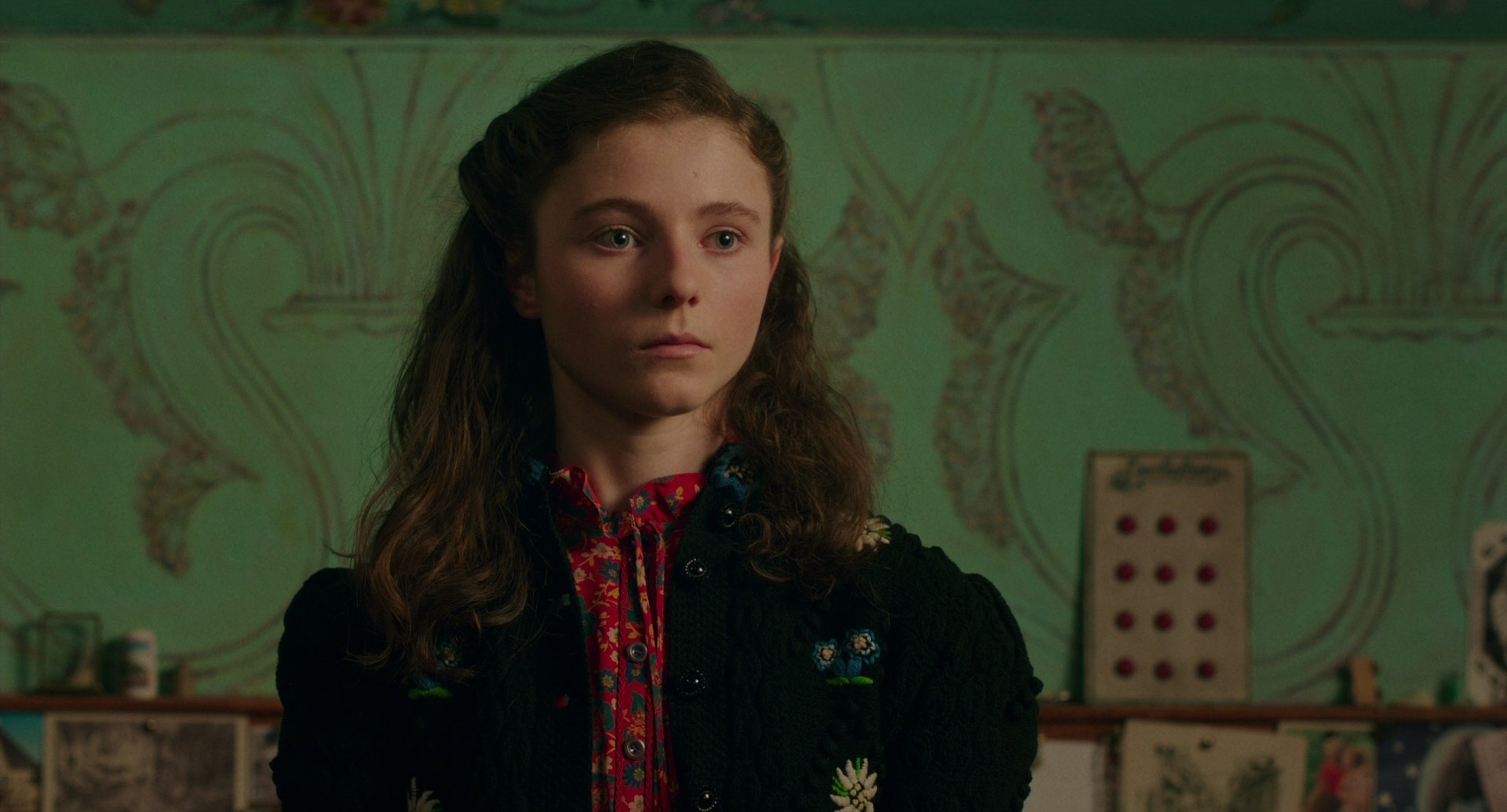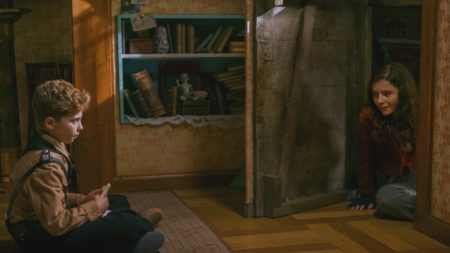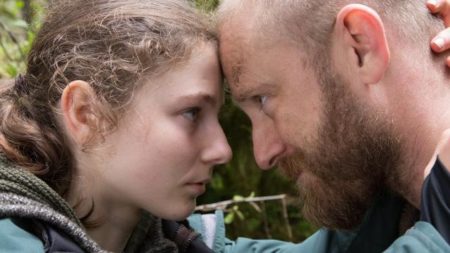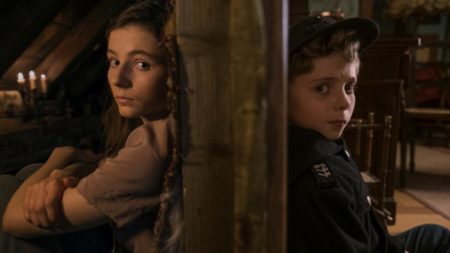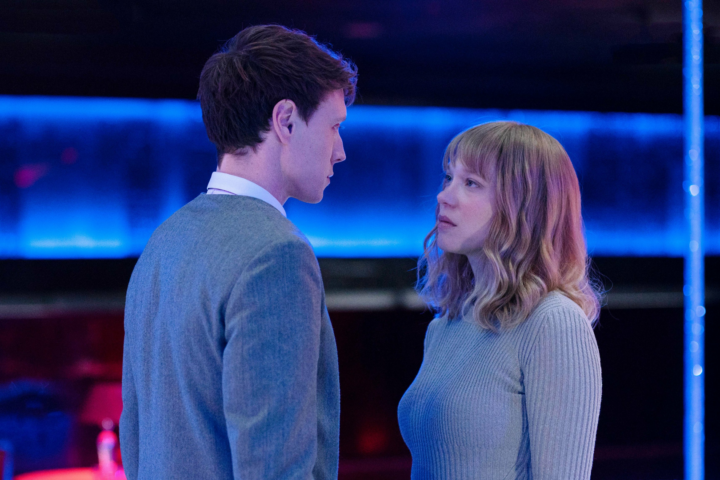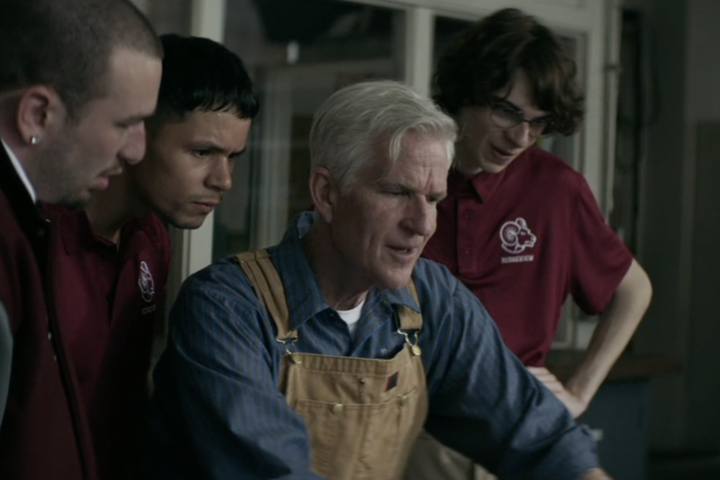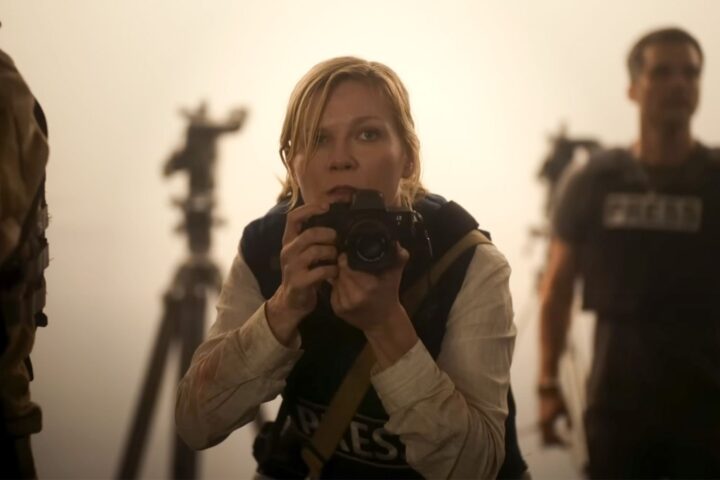It’s sometimes referred to as a once-in-a-generation talent. And it would not be an overstatement to say that nineteen-year-old New Zealand actress Thomasin Mckenzie, currently on screens in Taika Waititi’s jaunty wartime satire Jojo Rabbit and the gritty, Henry V monarchy drama The King, inspires such rapt descriptors.
In last year’s Leave No Trace, near the top of 2018’s best movies, McKenzie broke out powerfully as an off-the-grid teen living in the forests of the Pacific northwest with her emotionally damaged war vet father (Ben Foster), eventually coming of age and finding her place in an unexpected rural community. It was tremendously delicate, then forceful, performance, one where we saw a child become an adult onscreen, character and actress finding unique new voices.
In Waititi’s new Nazi lampoon, charting the battle between good and evil for a young boy’s heart and mind, the young star has the distinct challenge of playing it largely straight, and very sympathetic, as the Anne Frank-like Jewish teen hidden away in the family attic, and far from the picture’s broader burlesque. Her discovery prompts a tentative relationship between JoJo’s budding Hitler youth and his clandestine boarder, who becomes his confidant and, touchingly, first love.
I caught up with Thomasin McKenzie recently at Chicago’s Four Seasons hotel for a chat about her experiences on one of the year’s most inventive movies, why she feels it is important for this moment and her acute precision, in each role, balancing tenderness and strength.
LS: What were your first reactions on reading this way out there, daring screenplay?
TM: It was the kind of script where once you pick it up, you don’t put it down until it’s done. Sometimes you read a script and take breaks or get a snack or do something else and come back to it. I did not do that with this one! I was like, ‘I have to get to the end!’ It’s a beautiful script and one that was very well known. Every producer or agent I talked to before and after filming it would say, ‘Yes, I read that script!’ It was so unique that it really made its way around and people were really fascinated by it.
LS: Elsa is the ‘straight’ character in Jojo Rabbit, for the most part, to much of the satire happening out of her purview which is often quite absurdist. You play it more serious in the middle of the film’s mad inventiveness. How did you do this? Was it just a matter of focusing on your work as opposed to the tone of the whole?
TM: Yes, you could say that. Elsa was not really aware of a lot that was happening in the world around her; she had to find out all of her information either through a ten-year-old boy, who could never be fully trusted, and also from Rose, Scarlett Johansson’s character, whom she wasn’t able to see all the time. So Elsa was not aware of what was going on, and it was the same with me. Most of my time was spent working with Roman, and I didn’t have any scenes with Rebel Wilson or whoever else were the comedy characters. And although Elsa is funny and witty in moments, I didn’t want to play her as a comedy character. That didn’t really feel right. I think some of that naturally comes through because she herself is witty and funny; I don’t know how to play that.
LS: Onscreen, I find you intensely fragile. There’s something soft about your voice and manner, and we feel a great degree of empathy for you—we want you to be okay—but there’s also a great strength in you as well.
TM: Oh, yay!
LS: That certainly is in Leave No Trace as well as this film. You seem to exist in an area between those things and convey them, together, in an interesting way. Are you aware of those qualities you have? Maybe it’s just a part of who you are.
TM: I think in every single person is a degree of vulnerability and fear and of strength. And I am always really interested in a character that is maybe in danger or has vulnerability, but wants to put on a strong face. I think that is such an interesting sort of balance of being scared but not wanting to show it. And that’s not in every single character and every script, but I am very interested in that balance.
LS: For example, the scene in Leave No Trace where you are explaining to Dale Dickey that you have money to pay for rent. That film must have also been a great experience to work on.
TM: Yes, it was. It was a beautiful- I often think, ‘I wish I was back filming Leave No Trace right now.’ And interestingly, that scene- do you mean the one where I am unpacking the groceries?
LS: Yes.
TM: I felt really self-conscious in that scene. I did not feel like I was doing a good job. I think that is maybe because in that moment, my character Tom was feeling nervous. In that part of the movie she has really taken on the parent role; now is her time to look after her dad, so you had the switch of roles. I think she was feeling vulnerable and a bit out of her comfort zone, and I think that is why I felt nervous and unsure of myself and my performance.
LS: Sounds almost like you’re describing your Jojo Rabbit character; by the end of that film there could also be a potential such role switch. Elsa has needed to be cared for, but later she is with a young friend who may require the same from her.
TM: Yes, it’s interesting because at the end of the film we don’t know whether they stay together or not. We don’t know whether Elsa decides to run away from Germany and go to America or France or England or whatever. We don’t know what happens. There’s a whole range of possibilities.
LS: We are all looking at the same headlines every day. Why do you think this movie is important now?
TM: Yes. Taika wrote this script in 2010-2011, when there were Neo-Nazis and people with a lot of hateful ideas but they weren’t so in the public eye; they were more underground. He didn’t know when this film would come out that the political climate would be so inflamed and so hateful. And I think it is the perfect time for this film to come out, because it really is a reminder to people of the atrocities of our past and that we can’t let those things happen again. We can’t let these things be repeated. I think it’s a very important film for people of all ages to be seeing right now.
LS: After last year and now this one, you couldn’t be in a better position. You are on the cusp of a huge career. They always say that careers are made by movies you turn down. You will be offered a lot. What is your modus operandi for what attracts you?
TM: I don’t know! I think that over time my style and goals and vision for my future have really changed. In my mind, I used to put myself in a more naturalistic or- films that have a very clear meaning or message. Now I’m just more curious to challenge myself. I never want to play the same role over again. I want to do different things and try new things out. I might fail at some things and be more successful at others. I just want to do as much as I can and work with cool people.
LS: In the work you’ve done, there seems to be less what I would call ‘Acting’ with a capital A. There’s less doing stuff and more drawing us toward you quietly, in a way. I did twelve lectures last year on Leave No Trace…
TM: Did you?!
LS: Yes! People really loved that character and were very intrigued and moved by you, and one of the things I kept hearing was that there was a sort of stillness, or quiet, about you…
TM: It’s so weird to hear that people were talking about me!
LS: Yes, like 350 of them. I think there is a less is more quality to your acting. You seem to understand how to pull us toward you as opposed to just doing business. Do you know what I am trying to say?
TM: Yeah! It’s funny- when I’m in a scene, I feel like I’m being more expressive than what actually comes across. So a lot of the time if I feel like I am doing something that is overly dramatic or super full of expression or maybe a bit out of my comfort zone, I am like, ‘Ah ha! That was really awkward! It was so horrible!’ Then I watch it back and I am like, ‘Oh, that was nothing! You can barely even tell.’ I don’t know! I never really know what I’ve done until I’ve watched it.
LS: What’s the best part about your job?
TM: I think feeling like I am contributing to some kind of conversation. Like with Jojo Rabbit and the things we are talking about with this film, we are putting messages out there and I really like it to be a part of it and contribute in some way to this world. But also learning things. I learn so much through this job. Like with Leave No Trace, I learned so much about bees! Bees really excite me now. And about surviving on your own in the wilderness. Through Jojo Rabbit I learned a lot about our history, World War II and the Holocaust. You just learn so much!
LS: In both films, they are such interesting characters because each are living ‘underground.’ And there’s a line in Leave No Trace, perhaps the film’s signature line, where you say, ‘We can still think our own thoughts.’
TM: Yes.
LS: And I thought about that during Jojo Rabbit a well. That sort of happening between them. They are having a relationship privately that would not be understood out in the world or could not be. And it was the same thing in the other film. I thought those characters were, in some ways, kindred spirits.
TM: Yeah, I didn’t think about that! That’s true.
